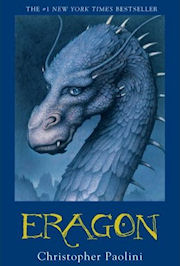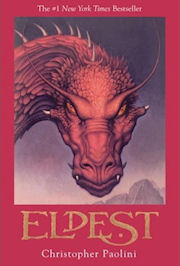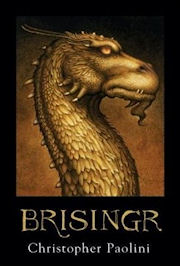(Spoiler free!)
I’ve just read my way through 3 of the finest books I’ve had the chance to enjoy in my life:
I have to admit that I have a certain bias towards fantasy stories set in medieval times and that, especially if dragons are involved, it’s hard for me not to give such books a bonus in my personal rating, but still, I think the books in the inheritance cycle are very well written and provide excellent narration.
Maybe my bias shows here already, but when Eragon appeared on the shelves, many critics moaned endlessly about how it was just a mix of Lord of the Rings and Star Wars. Some plot elements bore a distant likeness to Star Wars and Christopher Paolini used the well-known elf and dwarf stereotypes.
For me, this doesn’t lessen the books in any way. It would become a problem if he actually reused plot elements, because then, I could predict the story and all suspense would be destroyed, but that’s not the case here. Far from it. I think the inheritance cycle tells a genuinely good story.
It’s not without its weaknesses, either. The author sometimes falls trap to the “explainology” that is plaguing mainstream cinema: everything must have a clear and logical reasoning and you better stump the viewer (reader) with his nose into it and then, just to be sure, tell them that they’ve just observed an explanation for the behavior or happening of xy at time z.
The rules of magic in his world also feel like they are becoming a bit of a problem for the author. Magic in Alagaësia seems to be just too powerful. Whereas in other fantasy novels you wonder why the magicians don’t simply telekinetically sever a major artery or smash the brains of the soldiers in an approaching army, in the inheritance cycle, the magicians actually do it.
To counter these attacks, magicians erect wards to protect their own army against such spells. Attacking mages then again will try to find clever and obscure attacks the wards don’t protect against. And if that’s not complicated enough, being a magician is synonymous with also being a telepath, so magicians can battle each other physically, while attempting spells of doom, while using enchanted items and while trying to take control of the enemy magician’s mind.
In short, sometimes, magics seem quite out of control in this story. This earns both a point for a daring and novel idea, but also one for a common weakness in the plot.
Back on the bright side, everything else is solid good work. I am especially happy about how the storytelling doesn’t fell victim to the sightseeing syndrome: while it never stops being interesting, the story doesn’t just jump from spectacle to spectacle with everything inbetween just there to pave the way for another big event.
Granted, you will find this, too, in other books – and if the author is inept, it bcomes real nuisance that’s both boring to the reader and keeps the story from making progress, but I think this is one of the areas Christopher Paolini excels at. Whenever he tells about an unrelated experience by one of the characters, it satisfies something the reader was curious about and he still keeps the tension of the greater story alive.
The consequences of many decisions eragon has to face are as difficult to see for the reader as they appear to the character himself. And eragon doesn’t follow the accepted code of chivalry for modern action heroes. He loses his temper, makes a wrong decision or chooses to create a lesser evil to prevent a larger one. He is neither the typical anti-hero I guess most of us are now fed up seeing depicted again and again in mainstream entertainment nor is he the brilliant knight in shining armor.
The books also don’t shy away from depicting evil in the most real sense: torture, grave injustice and crimes for which you just want to hit your clenched fist on the table while reading. Who wouldn’t want to punch Galbatorix in the face – again and again – after reading what he really did near the end of Book 3?
Conclusion
So, as you may guess, in my opinion, while the concepts used are not novel, the inheritance cycle is a very well executed and unique story with interesting characters and all the suspense, emotions and beauty I could have wished for.
When I google for reviews, I get the impression that everyone is fond of criticizing the inheritance cycle, but I say this was one of the best reads of my live. I’ve bought the first three books and when book four is published, I shall buy them all again in a matching slipcase.
A book doesn’t define itself by how eloquent it’s written or by how novel the ideas are alone. A book should stoke emotions, entertain and if you will, satisfy some primal urges along the way. That, at least for me, is what makes a good book.


